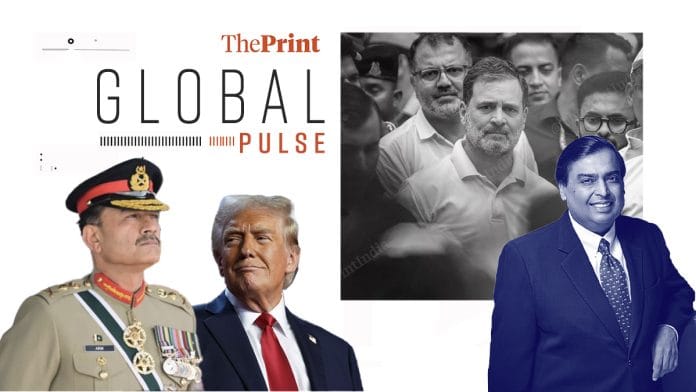New Delhi: Pakistan Field Marshal Asim Munir’s second visit to the US in two months has prompted a realisation—Trump’s ties with Pakistan are “blossoming” while India continues to “face scorn”, say Humza Jilani, John Reed, and James Politi in a Financial Times report. Munir has been described as receiving “an astonishing reception”, more so because he isn’t a head of State, making this kind of hospitality all the more rare.
“What’s happening in US-Pakistan relations is a surprise,” Michael Kugelman, a non-resident senior fellow at the Asia Pacific Foundation, has been quoted as saying. “I would describe the relationship now as one that’s enjoying an unexpected resurgence, even a renaissance. Pakistan has very successfully understood how to engage with such an unconventional president.”
“India and Pakistan’s contrasting diplomatic fortunes have the potential to upend geopolitics in volatile South Asia and are already feeding into trade, where the US gave Islamabad a relatively light 19 percent tariff while hitting New Delhi with a punitive 50 percent,” the report says.
Also in the Financial Times, Veena Venugopal writes in the India Business Briefing that the government’s announcement of blending 20 percent of ethanol with petrol has led to “consumer backlash, the likes of which it had never experienced before”.
“The backlash is from car owners concerned that the blended fuel decreases mileage and corrodes or damages crucial parts, forcing them to spend more on fuel and repair or maintenance. Their angst is further exacerbated by the fact that most car owners are in the dark about how much ethanol is actually in the fuel being pumped into their vehicles,” she writes.
After dominating global headlines for flying in Rihanna, Jamnagar is now in the news cycle for its refineries, which consist of Russian-bought oil, reports Alex Travelli in The New York Times. Trump’s move has pushed “India’s exporters into peril” as he essentially has declared that Indian companies have been profiting “from the international oil trade”.
“Mr Trump did not name the companies. But all roads lead back to Mukesh Ambani and his company, Reliance Industries,” says the report. “Its principal refinery in Jamnagar—part of Gujarat, the home state of India’s prime minister, Narendra Modi—is the biggest in the world.”
Many of Reliance’s investments, both in India and elsewhere, have been planned in consultation with Modi and other politicians, the report adds. “This area, including another refining business nearby, brings in 1.5 million barrels of oil every day, about a third of it shipped from Russia.”
The 11 August march by opposition leaders saw “chaotic scenes”, such as opposition leaders clambering over barricades, and the police hauling them into buses. These visuals were due to Rahul Gandhi’s claims that the “ruling party and the election commission are jointly manipulating elections through obscure additions and deletions to voter rolls”, write Mujib Mashal and Hari Das in The New York Times.
They highlight that the issue gained traction post the special intensive revision of electoral rolls in Bihar ahead of the state elections in November. “The election commission has cut over six million people, which Mr Modi’s party said was to clear the rolls of ‘infiltrators’,” the report says.
Meanwhile, The Washington Post rings the death-knell for “the Trump-Modi bromance”. There was the heyday—the Howdy Modi rally in Texas, and a similar event in Gujarat. And now, there are “deadlocked negotiations” and an “abrupt reversal” of fortunes, writes Joshua Yang in a column.
“Beyond India-Russia relations, personal rancour is a possible factor in play. Trump took offence with New Delhi’s behaviour in the aftermath of the India-Pakistan conflict in May, when India refused to acknowledge Trump’s role in mediating a ceasefire. Trump, gunning for the Nobel Peace Prize, has cited ending the India-Pakistan conflict as one of the reasons he deserves the award,” he writes.
At the core of the Trump-Modi trade standoff is not geopolitics, but cows. The dairy industry is of paramount importance to Modi, both as a source of cultural pride and due to India’s status as a “milk superpower.” The industry, however, is “grossly inefficient, subsidised, polluting (all that methane) and heavily protected by high tariff barriers”, notes The Economist.
“Proud as Indians are of their cows and their dairy farmers, they have to admit that both are, by international standards, woefully unproductive. The average American cow produces about seven times as much milk as her Indian competitor,” the report says.
“India protects its dairy farmers with import tariffs comparable to those Mr Trump is now imposing on Indian exporters: 40% on most butter and cheese and 60% on powdered milk. Without these protections, says Shashi Kumar, boss of Akshayakalpa, a privately owned organic-dairy business in southern India that works with 2,200 small farmers, “smallholder farms will collapse”.
(Edited by Madhurita Goswami)
Also Read: Global media dissects fractures in India-US ties & New Delhi’s ‘great-power delusions’






